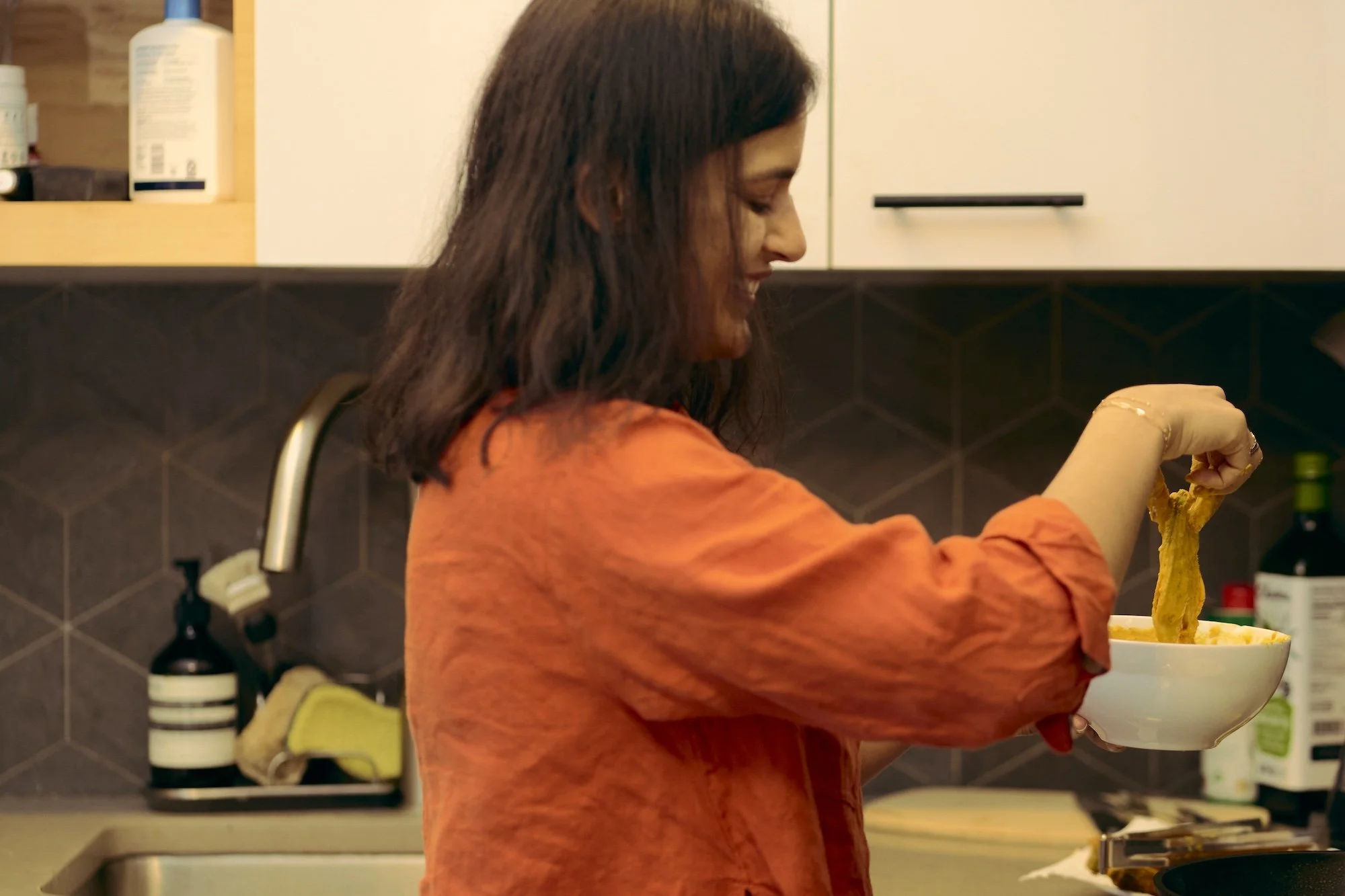The Importance of Home Gardens & Other Lessons from a Pandemic

Home gardens could be the answer to solving India’s hunger & malnutrition, the solution to our massive waste problem, and even offer inroads to unemployment. Sonal Alvares makes note of pandemic lessons.
Thriving megacities support dense populations on limited space. Citizens quietly suffer inequity, confined spaces, crowded transportation, inadequate infrastructure, encroachments, deforestation, air, noise and water pollution, and the elephant in the room, the ominous waste crisis.
But we often throw out this crisis along with the contents of our garbage bin — out of sight is out of mind. Even though waste is generated in our own homes, once it crosses the threshold, we wash our hands off it. From door-to-door housekeeping staff, to municipal authorities, and then to the contractor who makes that final journey to the landfill — there is no solid waste management here, only solid waste transportation.
Imagine a landfill if you haven’t seen one. A formidable mountain of trash. In India, Delhi and Mumbai are the cities that generate the most amount of solid waste in India. Of the total collected, which is more than 1.50 lakh metric tonne (MT), only 20 per cent (27,000 MT per day) is processed. The remaining 80 per cent (1,08,000 MT per day) is dumped into landfill sites. India will require 1250 hectares of land to keep this up every year. 1 hectare is the equivalent of 2 football fields. Landfills contribute significantly to methane emissions causing global warming and climate change. You see the problem.
Often the simplest solutions have the potential to rectify the most complex problems. And like our grandmother’s kitchen remedies, this too originates in that hallowed centre of the home. 50% of waste generated is organic — which means it can be converted to compost, and liquid fertiliser.
The small act of segregation at home would ensure that the authorities who receive the separated waste, are able to process it further through recycling, recovery and conversion, into energy or compost. If you already segregate, then your natural next step is to compost. And when you do both, you’re certified zero waste!
We’ve all lived strange new lives through 2020. Locked down in our homes, the windows of our flats reprised their role as windows to the outside world. A steadily growing group of home gardeners saw opportunity, and began to grow whatever they could, wherever they could. Herbs and vegetables perched on window sills, strung up balconies and sprawled out on terraces. People found that engaging with plants soothed weary city souls. Others found links to good health, when building immunity became crucial to preventing infection. Fresh, organically grown ingredients are at hand when you have a kitchen garden, retaining nutrition without any of the chemicals used in conventional farming, or contamination through transport.
Intentionally or otherwise, home chefs/kitchen gardeners began progressively addressing the problem of solid waste, one meal at a time. Anne Marie Bonneau, also known as Zero Waste Chef, famously said, “We don't need a handful of people doing zero waste perfectly. We need millions of people doing it imperfectly.” And that is exactly what urban farmers are doing.
At ‘native’ places, our grandparents had little pots, or small plots of land, with curry leaves, effusive mint and holy tulsi. Eventually these leaves found their way into a hissing bagar, steaming chai or stealthy kadha. It is no secret that traditional recipes follow seasonal growth patterns of vegetables, herbs, grain and legumes. Nature means for the food she grows to be consumed in the season of her bounty — wet, sunny, humid or dry. In doing so, she tends to dicey digestion, supplementing nutrition and perfecting the body’s balance.
Home chefs/ gardeners rely on ingredients from their daily harvest, for meals of the day. Fortunate ones with larger balconies often share produce with happy neighbours. Much like community kitchen gardens on common terraces where residents shoulder responsibilities of sowing, watering, mulching, harvesting and so on. Seasoned gardeners share advice like wellness coaches, espousing the therapeutic nature of gardening. Cooks will testify to the singular taste of dishes prepared with ingredients plucked that very morning. Everyone emphasises how simple and easy it is: Plants grow themselves with even the least amount of care. And now is as good a time as any, to start.
Choose a reason: health, fresh ingredients, therapy, entertainment, whatever. Start with a pot, soil, compost and seeds. Water, watch and learn. In a container, discard banana, onion, potato & vegetable peels, coffee grounds, tea leaves, and whatever waste comes out of the kitchen. Throw in soil and any microbes powder (you can find these online or at your local nursery). Think of microbes like your khatta, veerzan or curd starter. You need it to set the curd; similarly, you need microbes to kick start food waste into compost.
Space for the compost set up can be a challenge; what you want is a remote corner of the house and a bin or terracotta pot. Many bins have a tap to drain out the liquid fertiliser which can be used to feed your vegetable garden. Plants guzzle it.
You will find a large community of home composters and home kitchen gardeners online. They are an unusually helpful lot. No question is left unanswered. Convincing your family to get involved may require a bit more effort.
Neisha, a mother of two young children has lived in Mumbai all her life. Her grandparents lived in a bungalow with a garden full of fruit trees, but she grew up in her parents’ flat, her experience with plants limited to what she found on her dinner plate. Today in her own Mumbai 2BHK, she composts her wet waste, and segregates the dry for recycling. On a whim, she tried out growing a few herbs and with each success, her confidence grew. Her window grill is now covered with chillies, mint, avocado, curry patta, potatoes and tomatoes. “Early mornings are my alone time, when I inspect my plants and sit down with a cup of coffee. An old terracotta pot for compost provides nutritious khat to help them flourish.”
There is a quiet but tremendous potential to grow food closer to where it will be consumed. Doing so reduces transportation costs and distribution loss. Predictions show that 55% of Indians will be living in urban areas by 2050. While space maybe hard to find, rooftops show noteworthy promise. Countries around the world are growing a variety of produce on rooftops. France, Singapore, UK, Thailand are increasingly finding that urban farms are safeguarding the country’s food security.
Urban farms reduce rainwater runoff, dissolve heat-islands, and improve micro climates, while reusing grey water and waste as compost. Community gardens build cohesive communities. The challenges of rural farming of animals and pests are non-factors here. Plus, water and nutrition for the urban farm is more efficiently managed. Other advantages include employment. After the pandemic, there is a desperate need for more employers and less employees. Farms also enhance health through fresher ingredients, nutritionally diverse diets and stress relief. Urban farmers also help reduce plastic use, which would otherwise be part of store-bought produce.
We are faced with an irony of abundance on the one hand, and scarcity on the other. India grows enough food. We are the world’s largest producer of milk, pulses and jute, and the second largest of rice, wheat, sugarcane, groundnut, vegetables, fruit and cotton. And yet 25% of the world’s hungry live in India, and an estimated 43% of children under 5 are malnourished.
Because of the pandemic, or despite it, we are living through one of the biggest, most life-changing events in history. But we are also nearly missing an opportunity to transform tragedy into joy. Other species, and the natural world around us, have thrived during to the pandemic. Will a return to normal come at a cost to the natural world? We have this time to envision a regenerative way of production for consumption that is within reach.
A survey of 104 urban farmers engaging in both composting and kitchen gardening, from across cities in India last August, demonstrates the potential, ease and benefits of urban gardening. An overwhelming majority of them had but one thing to say: “Start small, but start today.” And almost every one reported positive emotional wellbeing as a happy side effect, using words like contentment, satisfaction, bliss, meditative, peaceful and happy. Do we need more reasons to start?
Sonal is an environment and nature conservation writer living in Mumbai.
ALSO ON THE GOYA JOURNAL







